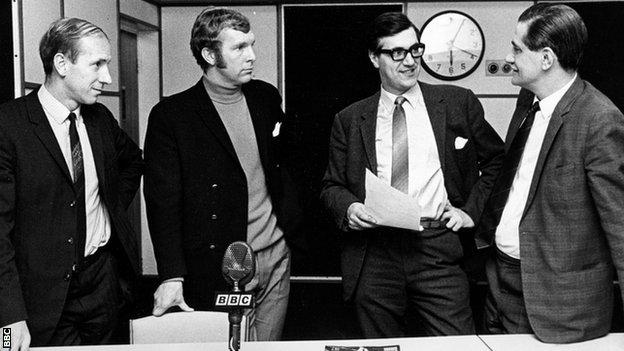Gerald Sinstadt: Former BBC and ITV commentator dies aged 91
Last updated on .From the section Sport

Former television commentator Gerald Sinstadt has died at the age of 91.
Sinstadt's work for the BBC and ITV made him one of football broadcasting's most recognisable voices in the 1970s after starting at Granada Television.
From 1970 to 1982, he covered four World Cups for ITV and later worked on Olympic Games for the BBC.
"He was a craftsman, a very good commentator and just a lovely man," said Andrew Clement, who worked with Sinstadt at the BBC for about 30 years.
While racist taunts from the terraces during the 1970s were often overlooked by football commentators, Sinstadt was one of the first to call out the abuse during his commentary, such as during West Brom's 5-3 win at Manchester United in 1978.
He commentated on many other iconic games of that period, including Denis Law's backheel goal for Manchester City against United in 1974 and Liverpool's European Cup quarter-final second-leg win against St Etienne in 1977.
He also covered West Germany's victory against France in their controversial 1982 World Cup semi-final and Diego Maradona's goal at the 1994 World Cup prior to his expulsion from the tournament.
After rejoining the BBC in the 1980s, Sinstadt was the pitchside reporter on the day of the Hillsborough disaster in 1989 and appeared in Jimmy McGovern's 1996 TV docu-drama about the tragedy.
He also covered rower Sir Steve Redgrave winning the first four of his five Olympic gold medals and the Boat Race for the BBC.
Sinstadt was a regular on Football Focus, Match of the Day and Final Score until his retirement. Towards the end of his career he was often called on to write and voice obituaries with Clement.
"He taught me a lot," said BBC Sport executive producer Clement. "He was very generous with his time and was a wonderful mentor to a lot of us as we started off in television.
"He was a fantastic wordsmith, particularly when paying tribute to some of the greats of the game in obituaries.
"His use of language was second to none and he was brilliant at putting words to pictures. He used to sit in on the edit, which was rare in those days. If I produced a shot for him, he would bring it to life with a perfectly chosen phrase or image. He crafted his pieces."
Born in Folkestone in Kent, Sinstadt started his career in 1949 on the British Forces Broadcasting Service, where he met Barry Davies.
Upon their return to the UK, Sinstadt helped Davies join him on BBC Radio, where the former worked in the 1950s and 1960s, and both became two of the most recognisable voices in sports broadcasting in the 1970s.
Davies said: "He gave me my first job in broadcasting. That was his one big mistake!
"We went on to cover many games together and he was a very good commentator, for radio and television."
Sinstadt also commentated on golf for Channel 4 and in 1987 was the first to voice the long-running Trans World Sport programme. Away from sport he also produced TV programmes on his other big passion, opera.
Having settled in the Potteries, after his retirement Sinstadt continued to write a weekly column for the Stoke Sentinel until 2019.
BBC Sport's chief football writer Phil McNulty added: "He was the voice of north-west football for so long for so many of us and later showed his versatility and craftsmanship with the BBC."

- Inside the Song with Paul McCartney: McCartney reveals his inspiration behind the hit 'Yesterday'
- 'I'm a footballer and I'm gay': Adelaide United's Josh Cavallo comes out
